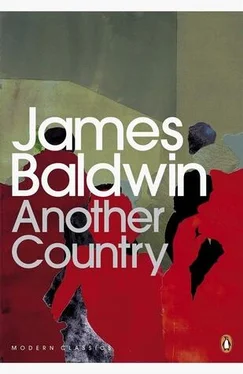The trouble with a secret life is that it is very frequently a secret from the person who lives it and not at all a secret for the people he encounters. He encounters, because he must encounter, those people who see his secrecy before they see anything else, and who drag these secrets out of him; sometimes with the intention of using them against him, sometimes with more benevolent intent; but, whatever the intent, the moment is awful and the accumulating revelation is an unspeakable anguish. The aim of the dreamer, after all, is merely to go on dreaming and not to be molested by the world. His dreams are his protection against the world. But the aims of life are antithetical to those of the dreamer, and the teeth of the world are sharp. How could Eric have known that his fantasies, however unreadable they were for him, were inscribed in every one of his gestures, were betrayed in every inflection of his voice, and lived in his eyes with all the brilliance and beauty and terror of desire? He had always been a heavy, healthy boy, had played like other children, and fought as they did, made friends and enemies and secret pacts and grandiose plans. And yet none of his playmates, after all, had ever sat with Henry in the furnace room, or ever kissed Henry on his salty face. They did not, weighed down with discarded hats, gowns, bags, sashes, earrings, capes, and necklaces, turn themselves into make-believe characters after everyone in their house was asleep. Nor could they possibly, at their most extended, have conceived of the people he, in the privacy of night, became: his mother’s friends, or his mother — his mother as he conceived her to have been when she was young, his mother’s friends as his mother was now; the heroines and heroes of the novels he read, and the movies he saw; or people he simply put together out of his fantasies and the available rags. No doubt, at school, the boy with whom he was wrestling failed to feel the curious stabs of terror and pleasure that Eric felt, as they grappled with each other, as one boy pinned the other to the ground; and if Eric saw the girls at all, he saw mainly their clothes and their hair; they were not, for him, as were the boys, creatures in a hierarchy, to be adored or feared or despised. None of them looked on each other as he looked on all of them. His dreams were different — subtly and cruelly and criminally-different: this was not known yet, but it was felt. He was menaced in a way that they were not, and it was perhaps this sense, and the instinct which compels people to move away from the doomed, which accounted for the invincible distance, increasing with the years, which stretched between himself and his contemporaries.
And, of course, in Eric’s case, in Alabama, his increasing isolation and strangeness was held, even by himself, to be due to the extreme unpopularity of his racial attitudes — or, rather, as far as the world in which he moved was concerned, the lack of any responsible attitudes at all. The town in which Eric lived was celebrated and well-to-do, but it was not very big; as far as Eric was concerned, the South was not very big, certainly, as it turned out, not big enough for him; and he was the only son of very prominent people. So it was not long before his appearance anywhere caused heads to shake, lips to purse, tongues to stiffen or else, violently, venomously, to curl around his name. Which was also, however, his father’s name, and Eric, therefore, encountered, very often and very soon, the hideous obsequiousness of people who depised him but who did not dare to say so. They had long ago given up saying anything which they really felt, had given it up so long ago that they were now incapable of feeling anything which was not felt by a mob.
Now, Eric stepped out of the shower, rubbing his body with the enormous, rough, white towel Yves had placed in the bathroom for him. Yves did not like showers, he preferred long, scalding baths, with newspapers, cigarettes, and whiskey on a chair next to the bathtub, and with Eric nearby to talk to, to shampoo his hair, and to scrub his back. The thought of the Oriental opulence which overtook Yves each time he bathed caused Eric to smile. He smiled, but he was troubled, too. And as he put on his bathrobe, his body tingled less from the effect of the towel and the toilet water than from his image, abruptly overwhelming, of Yves leaning back in the bathtub, whistling, the washrag in his hand, a peaceful, abstracted look on his face and his sex gleaming and bobbing in the soapy water like a limp, cylindrical fish; and from his memory, to which his image was somehow the gateway, of that moment, nearly fifteen years ago, when the blow had inexorably fallen and his shame and his battle and his exile had begun. He walked into the dining room and poured himself a drink. Then the bottle was empty and he dropped it in the waste basket. He lit a cigarette and sat down in a chair near the window, overlooking the sea. The sun was sinking and the sea was on fire.
The sun had been sinking on that far-off day, a Sunday, a hot day. The church bells had ceased and the silence of the South hung heavy over that town. The trees along the walks gave no shade. The white houses, with their blank front doors, their blackly shadowed porches, seemed to be in battle with the sun, laboring and shuddering beneath the merciless light. Occasionally, passing a porch, one might discern in its depths a still, shadowed, faceless figure. The interminable pickaninnies were playing in the invincible dirt — where Eric was walking that day, on a back road, near the edge of town, with a colored boy. His name was LeRoy, he was seventeen, a year older than Eric, and he worked as a porter in the courthouse. He was tall and very black, and taciturn; Eric always wondered what he was thinking. They had been friends for a long time, from the time of Henry’s banishment. But now their friendship, their effort to continue an impossible connection, was beginning to be a burden for them both. It would have been simpler — perhapsif LeRoy had worked for Eric’s family. Then all would have been permitted, would have been covered by the assumption of Eric’s responsibility for his colored boy. But, as things were, it was suspect, it was indecent, that a white boy, especially of Eric’s class and difficult reputation, should “run,” as Eric incontestably did, after one of his inferiors. Eric had no choice but to run, to insist — LeRoy could certainly not come visiting him.
And yet there was something absolutely humiliating in his position; he felt it very sharply and sadly, and he knew that LeRoy felt it, too. Eric did not know, or perhaps he did not want to know, that he made LeRoy’s life more difficult and increased the danger in which LeRoy walked — for LeRoy was considered “bad,” as lacking, that is, in respect for white people. Eric did not know, though of course LeRoy did, what was already being suggested about him all over town. Eric had not guessed, though LeRoy knew only too well, that the Negroes did not like him, either. They suspected the motives of his friendliness. They looked for the base one and naturally they found it.
So, shortly before, when Eric had appeared in the road, his hands in his pockets, a hoarse, tuneless whistle issuing from his lips, LeRoy had jumped off his porch and come to meet him, striding toward Eric as though he were an enemy. There was a snicker from LeRoy’s porch, quickly muffled; a screen door slammed; every eye on the street was on them.
Eric stammered, “I just dropped by to see what you were doing.”
LeRoy spat in the dusty road. “Ain’t doing nothing. Ain’t you got nothing to do?”
“You want to take a walk?” Eric asked.
For a moment it really seemed that LeRoy was going to refuse, for his scowl deepened. Then a faint smile touched his lips. “Okay. But I can’t walk far. I got to get back.”
Читать дальше












